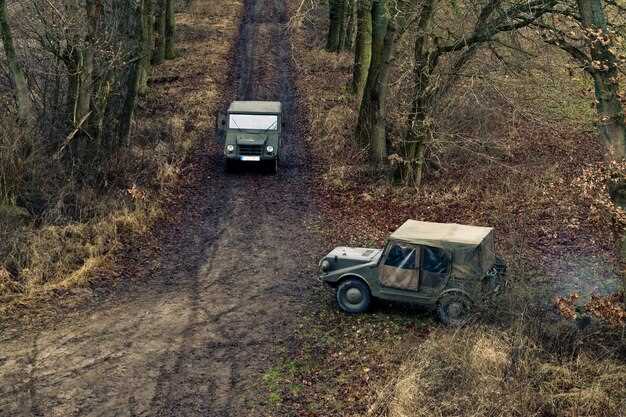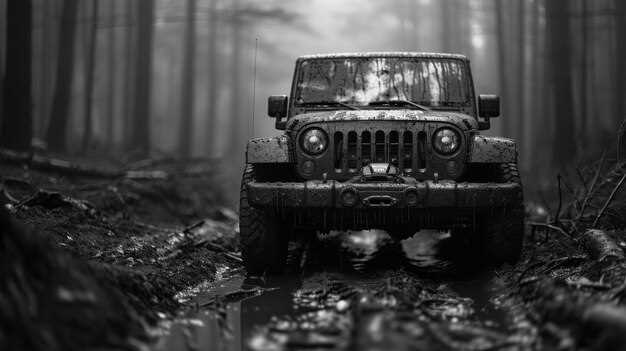Jeep vs Land Rover – off-road brand battle


When it comes to off-road adventures, two names often dominate the conversation: Jeep and Land Rover. Both brands have carved out distinct identities in the rugged terrain vehicle market, each bringing its own heritage, technology, and design philosophies to the table. This comparison delves into the strengths and weaknesses of these iconic brands, revealing what makes them appealing to off-road enthusiasts around the world.
Jeep, with its rich history dating back to World War II, has been synonymous with the concept of off-roading. Its models, such as the Wrangler and the Gladiator, emphasize durability and simplicity, catering to drivers who value raw capability and a no-nonsense approach. On the other hand, Land Rover offers a fusion of luxury and performance, characterized by vehicles like the Defender and Discovery. Known for their innovative technology and comfort, Land Rovers also excel in navigating the most challenging terrains while providing a premium driving experience.
This comparison will utilize various criteria, including off-road performance, technological innovation, interior comfort, and price, to determine which brand stands out in the world of off-roading. By examining the unique features and benefits of each brand, we aim to provide an insightful guide for potential buyers and off-road aficionados seeking their next adventure vehicle.
Powertrain Comparison: What Engine Options Deliver the Best Off-Road Performance?
When comparing the powertrains of Jeep and Land Rover, it’s essential to examine the engine options that enhance off-road capabilities. Both brands offer a range of engines designed to tackle rough terrains, but they have distinct approaches.
Jeep primarily relies on a selection of robust engines that are well-suited for off-road adventures. The iconic Jeep Wrangler, for instance, provides options including a naturally aspirated V6, a turbocharged four-cylinder, and a potent V8 in the Wrangler Rubicon. The V6 engine delivers ample torque, while the turbocharged option offers balance between power and fuel efficiency, catering to various off-road needs. The V8 engine stands out for its ability to conquer challenging landscapes with exceptional power.
In contrast, Land Rover emphasizes luxury alongside performance in its powertrain offerings. The Land Rover Defender, a prominent off-roading model, features turbocharged inline-four and V6 engines. The inline-four engine provides a lighter weight advantage and decent torque, while the V6 is designed for those seeking higher power output. Additionally, Land Rover’s commitment to hybrid technology offers alternative engine choices that blend electric efficiency with traditional combustion power, appealing to environmentally conscious adventurers.
Both manufacturers equip their vehicles with advanced four-wheel-drive systems to optimize traction and control in off-road conditions. Jeep’s Rock-Trac system enhances off-road performance with low-range gearing and locking differentials, while Land Rover’s Terrain Response system allows drivers to customize vehicle settings based on the driving environment.
Ultimately, the best engine option for off-road performance depends on specific driving preferences and conditions. Enthusiasts who prioritize raw power may lean towards Jeep’s V8 engine, whereas those seeking a balance of luxury and capability might find Land Rover’s offerings more appealing. A thoughtful comparison of these powertrains reveals unique strengths that cater to diverse off-road adventures.
Durability Assessment: Which Brand Handles Extreme Terrain Better?

When it comes to off-road performance, durability stands as a critical factor in determining a vehicle’s capability to handle extreme terrains. In this section, we will provide a detailed comparison of Jeep and Land Rover to highlight which brand fares better under challenging conditions.
Both brands boast strong legacies in the off-road segment, yet they adopt different engineering philosophies that influence durability. The key aspects to consider in this assessment include:
- Build Quality: Jeep vehicles are known for their rugged construction and practical design. Reinforced frames and high-strength materials contribute to their resilience in tough environments. Conversely, Land Rover focuses on luxury and comfort alongside durability, often incorporating lighter materials that may not withstand harsh conditions as effectively.
- Suspension Systems: Jeep models typically feature solid axles, enhancing their ability to absorb impacts and maintain wheel contact over uneven surfaces. Land Rover, with its advanced air suspension systems, offers impressive articulation and comfort, albeit with potential vulnerabilities in extreme scenarios.
- Traction Control: Jeep’s four-wheel drive systems are designed for severe off-road applications, providing reliable traction via mechanical locking differentials. Land Rover, while featuring sophisticated electronic traction aids, may face limitations when extreme torque is required.
- Water and Mud Resistance: Both manufacturers produce vehicles with impressive water fording capabilities; however, Jeep typically provides better mud clearance and effective skid plates that protect the undercarriage in hazardous situations.
Based on extensive off-road testing, several real-world scenarios demonstrate the differences between the two brands:
- Rock Crawling: In rock crawling scenarios, Jeeps, especially the Wrangler, often outperform due to their weight distribution and superior ground clearance.
- Mud and Snow Performance: Land Rover’s Terrain Response system excels in adaptable conditions, but Jeep’s aggressive tires provide an edge in deep mud and snow.
- Rugged Trails: On rugged trails where durability is paramount, Jeep vehicles tend to exhibit fewer breakdowns and maintain structural integrity longer than their Land Rover counterparts.
In conclusion, while Land Rover offers an impressive level of comfort and advanced technology, when assessing which brand truly handles extreme terrain better, Jeep emerges as the more durable choice for rugged off-road enthusiasts. Its robust construction and pragmatic engineering make it a trusted option for those who frequently venture into challenging landscapes.
Technology Features: Which SUV Offers Superior Off-Road Capabilities?

When comparing off-road capabilities of Jeep and Land Rover, technology features play a critical role in determining which SUV excels in challenging terrains. Both brands have developed advanced systems that enhance traction, stability, and maneuverability in rugged environments.
Jeep vehicles, particularly the Wrangler and Grand Cherokee, feature the Selec-Trac and Rock-Trac systems. These systems provide multiple drive modes, allowing drivers to select settings optimized for different conditions, such as sand, mud, or rock crawling. The Wrangler’s locking differentials and sway bar disconnect further enhance its capability, enabling superior traction in extreme scenarios.
On the other hand, Land Rover’s Terrain Response system offers equally sophisticated technology. This system adapts the vehicle’s settings to various terrains, including grass, gravel, snow, mud, and sand. By automatically adjusting the power delivery and traction control, Land Rover ensures optimal performance across diverse conditions. The brand’s advanced air suspension also contributes to off-road versatility by allowing for adjustable ride heights, which can prevent underbody damage on rough trails.
Furthermore, Jeep employs a robust frame and skid plates to enhance durability, while Land Rover focuses on advanced traction technologies like All-Terrain Progress Control, which enables drivers to maintain a steady speed over challenging terrains. This comparison reveals that while both brands excel in their own rights, Jeep leans towards raw capability and toughness, whereas Land Rover emphasizes sophisticated technology and luxury integration in its off-road performance.
Ultimately, the choice between Jeep and Land Rover should reflect the specific off-road requirements of the driver. Enthusiasts seeking rugged performance may prefer Jeep, while those looking for a combination of comfort and advanced technology might be drawn to Land Rover.
